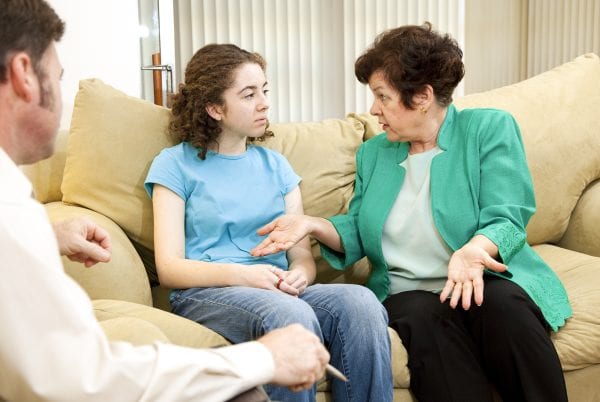Home & Family

In this fourth of a five-part series, you will learn ways to get your teen to open up about being bullied and approaches to resolve the problem together.
As teens make their way through the school years, and peers become more important in their lives, parents/ guardians may have concerns about how their teen is being treated—or mistreated—by others. When this happens, the desire is usually to help lessen the negative effects on their child’s well-being.
During early adolescence, most teens experience some teasing and put-downs, as well as some physical pushing and shoving. But for some, mistreatment at the hands of peers is more severe, with potentially longer-lasting consequences in terms of self-confidence, interest in school, social connections (such as feelings of loneliness) and behavior changes (such as withdrawing from peers or becoming more aggressive).
When bullying occurs, parents/guardians often ask, What can we do to support our children when they experience bullying? This article outlines a strategy based on three key steps:
- Gather Information
- Offer problem-solving advice based on what you know of the situation and your teen’s likely reaction.
- Keep track of how well the strategies work and make changes as needed.
Gather Information
 If you suspect that your teen is being bullied, talk to him or her about it. While some teens are vocal about mistreatment, others are not. Ask questions and try to get information from your teen as well as others, especially teachers and counselors, who may have some knowledge of peer group experiences.
If you suspect that your teen is being bullied, talk to him or her about it. While some teens are vocal about mistreatment, others are not. Ask questions and try to get information from your teen as well as others, especially teachers and counselors, who may have some knowledge of peer group experiences.
It is most helpful if parents/guardians listen attentively and nonjudgmentally so that they can fully understand the bullying situation. As information is presented, it is important to help teens not to blame themselves for what is happening.
To find out if your teen is being bullied, consider asking questions such as these:
- I notice that you have been sad coming home from school lately. Is there anything happening to you there?
- This is the third time you haven’t wanted to go to school. Is there something happening that makes you feel like you don’t want to go?
- I’ve noticed you’ve been taking the long way walking home from school rather than the usual way. Is there anything you want to talk about? Maybe I can help.
When your teen tells you he/she is being bullied, consider this approach for further information gathering:
- How does it make you feel when other kids act this way? Sad? Angry? Anxious? Embarrassed?
- When and where are you being bullied? Is it a place or situation that you can avoid? Is it during lunch, in the hall, in a classroom, on the bus, or somewhere else?
- Is there anything in particular that seems to trigger the bullying? Was it something someone said? Clothes? Appearance?
- What have you already tried to do to stop them from bullying you? Have you asked them to stop? Did you get in their face? Walk away? Tell someone about it? What happened when you tried? Did it help, hurt, or make no difference?
- Does your teacher know? Do you feel comfortable telling your teacher what is happening to you? What do you think he/she might do to solve the problem?
- Did you talk to the school counselor? Does the counselor know? Do you feel comfortable talking to him/her?
It is important to write down the answers to these questions. You will need this information if it becomes necessary to contact school staff or to write a formal complaint to the appropriate staff person at the school. It also will serve as a documented reminder of the information you have and the actions that your teen has already taken.
Follow a Problem-Solving Process
 When youth believe that their parents/guardians are supportive and capable of providing practical help, they are more likely to tell them they are being bullied at school. This may place you in the role of advisor, coach, or even practice partner as you help your teen navigate challenging social situations.
When youth believe that their parents/guardians are supportive and capable of providing practical help, they are more likely to tell them they are being bullied at school. This may place you in the role of advisor, coach, or even practice partner as you help your teen navigate challenging social situations.
Maintaining a supportive and open relationship with your teen is always key. Beyond this there are specific actions you can take to deal with mistreatment, harassment, and physical harm that your teen may be experiencing at the hands of peers.
Approach problem-solving as a joint activity. When you brainstorm solutions with your teen, you empower your teen.
Separate your feelings from those of your teen. When you learn that your child is being bullied, your own personal feelings and experiences can impact how you respond and the type of advice you offer. Keep in mind that the advice you provide should reflect your teen’s feelings and needs, not your own.
Have your teen tell an adult at school. This strategy often leads to good outcomes. Teachers, counselors, assistant principals, and other school staff are good options to consider.
Do not use retaliation (fighting back) as part of the plan. Some parents/guardians, especially those frustrated and desperate to stop the bullying, believe that the only way to deal with bullies is to stand up to them by physically fighting back, giving them at least a taste of their own behavior. But this often makes things worse, at least in the longer term. Your teen may get in trouble at school, and it may cause the bullying to become worse. Consequently, avoid advising your teen to stand up to the bully by hitting him/her or engaging in other hurtful behavior.
Try different strategies with your teen to help him/ her deal with peers who bully. Dealing with bullies is sometimes as straightforward as changing routines, such as taking a new route to and from school to avoid certain peers. If the bullying is less severe, good strategies may be to ignore the bully or to stay around friends in areas where the bullying usually occurs. Such simple changes are often not enough, however; the bullying continues or occurs in places where youth are unable to avoid or ignore it. If the bullying is more persistent and threatening, more assertive strategies may be needed.
An assertive strategy is for your teen to practice standing up straight and saying loudly, Stop doing to me! Shouting brings attention to adults and others so that they can hear what is happening. Being assertive lets the bully know that you do not like how he/ she is treating you.
Depending on the personality of your teen and the situation, humor or sarcasm may be helpful to disarm the bully. For example, Bully: Everybody hates you! Target: Really? That’s interesting. Why do you think that? Or, I’m pretty sure you don’t know everyone, so that’s not true.
Whatever strategies are used, keep in mind that contacting the bully or his/her parents/guardians often backfires. Focus instead on what you can do to help your teen and how you can work with the school to tackle the problem. Try different approaches and keep the conversation going.
Keep Track of Improvement
It is important to check in with your teen to see if the plan worked and to make any necessary changes. Additional follow-up conversations can help you determine if further action is needed.
Keep in mind, even the best advice may not yield the outcomes that you and your teen desire. If the plan does not work, don’t give up. You may need to call, send an email or letter, and even meet with school administrators, counselors, and teachers.
It can be helpful for both you and your teen to keep a daily journal that summarizes conversations and issues at school, suggestions that were made, strategies used to stop the bullying, and if and how they helped.
Conclusion
When youth experience bullying, it can take a toll on them and their families. Whatever the circumstance, it is crucial never to blame the victim.
Even after you create strategies to help your teen deal with bullying behaviors, there is no guarantee that those efforts will be successful. Still, you play an important role in helping your teen to cope with and manage bullying situations. Through whatever challenges are faced and whatever assaults on self-esteem and worthiness are experienced, reassure your teen of his/her value. Show your teen that he/she is loved and cherished.
All youth have strengths and interests that can be encouraged. Encouragement can help to soften the blows to self-esteem that often follow bullying. Caring, supportive, and proactive responses are the most beneficial actions you can take to help your teen deal with being bullied.
Adrienne M. Duke, Extension Specialist, Assistant Professor, and Gregory Pettit, Professor Emeritus, each in Human Development and Family Studies, Auburn University
Reviewed November 2021, Advancing Bullying Awareness: Parenting Strategies for a Teen Being Bullied, FCS-2274

